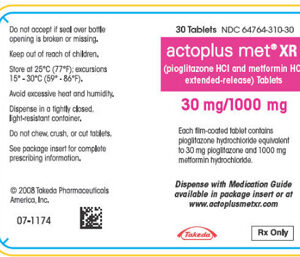Metformin is a widely used oral medication that belongs to the biguanide class of drugs. It is primarily prescribed for the treatment of type 2 diabetes, but it may also be used to manage other medical conditions such as polycystic ovary syndrome (PCOS) and gestational diabetes.
The main mechanism of action of metformin is reducing the amount of glucose produced by the liver and increasing the body’s sensitivity to insulin. By doing so, it helps to lower blood sugar levels and improve glycemic control.
When Not to Take Metformin
Metformin is contraindicated in individuals with certain medical conditions or situations. It is important to inform your healthcare provider about any existing medical conditions or medications you are taking before starting metformin therapy. The following are contraindications for metformin:
- Severe kidney disease or impaired renal function
- Liver disease or abnormal liver function
- History of lactic acidosis
- Heart failure or unstable cardiovascular status
- Alcohol abuse or excessive alcohol consumption
- Allergy or hypersensitivity to metformin or any of its components
Managing Side Effects
Like any medication, metformin can cause side effects. Most side effects are mild and may subside as your body adjusts to the medication. However, it is important to be aware of potential side effects and consult your healthcare provider if they become bothersome. Common side effects of metformin include:
- Nausea and vomiting
- Diarrhea
- Abdominal discomfort or bloating
- Metallic taste in the mouth
- Loss of appetite
- Weakness or fatigue
In rare cases, metformin can cause a serious condition called lactic acidosis. Symptoms of lactic acidosis include muscle pain, difficulty breathing, dizziness, and slow or irregular heartbeat. If you experience any of these symptoms, seek medical attention immediately.
Usage Instructions
When taking metformin, it is important to follow the instructions provided by your healthcare provider. Typically, the medication is taken orally with meals to reduce gastrointestinal side effects. The dose and frequency of metformin will depend on the individual’s age, medical condition, and response to treatment.
If you miss a dose of metformin, take it as soon as you remember. However, if it is close to the time for your next dose, skip the missed dose and continue with your regular schedule. Do not double up on doses to make up for a missed one.
An overdose of metformin can lead to lactic acidosis, a potentially life-threatening condition. Symptoms of an overdose may include drowsiness, nausea, vomiting, stomach pain, and difficulty breathing. If you suspect an overdose, seek immediate medical attention.
Understanding Drug Interactions
Metformin can interact with certain medications, altering their effectiveness or increasing the risk of side effects. It is important to inform your healthcare provider about all medications, supplements, and herbal products you are taking before starting metformin therapy. Common drug interactions with metformin include:
| Drug Class | Examples |
|---|---|
| Medications that increase the risk of lactic acidosis | Alcohol, cimetidine, carbonic anhydrase inhibitors |
| Medications that can cause hypoglycemia | Insulin, sulfonylureas |
| Medications that can impair kidney function | Nonsteroidal anti-inflammatory drugs (NSAIDs) |
| Medications that can affect blood sugar levels | Beta-blockers, corticosteroids, diuretics |
Questions Answered
-
Can metformin be used in combination with insulin?
Yes, metformin can be used together with insulin to improve blood sugar control in individuals with type 2 diabetes. It helps to reduce insulin resistance and may lower the required insulin dose.
-
What should I do if I experience persistent gastrointestinal side effects?
If you experience persistent gastrointestinal side effects such as nausea and diarrhea, inform your healthcare provider. They may adjust your dose or recommend strategies to manage the side effects.
-
Can metformin cause weight loss?
Metformin may result in modest weight loss, particularly in individuals with obesity and insulin resistance. However, individual responses to metformin can vary, and it is not specifically approved for weight loss.
-
Is metformin safe during pregnancy?
Metformin is generally considered safe to use during pregnancy, but it is important to consult with your healthcare provider. They will evaluate the potential benefits and risks in your specific situation.
-
Can metformin be used in children?
Yes, metformin can be used in children for the treatment of type 2 diabetes. The dose and monitoring will be determined based on the child’s age, weight, and medical condition.






Reviews
There are no reviews yet.